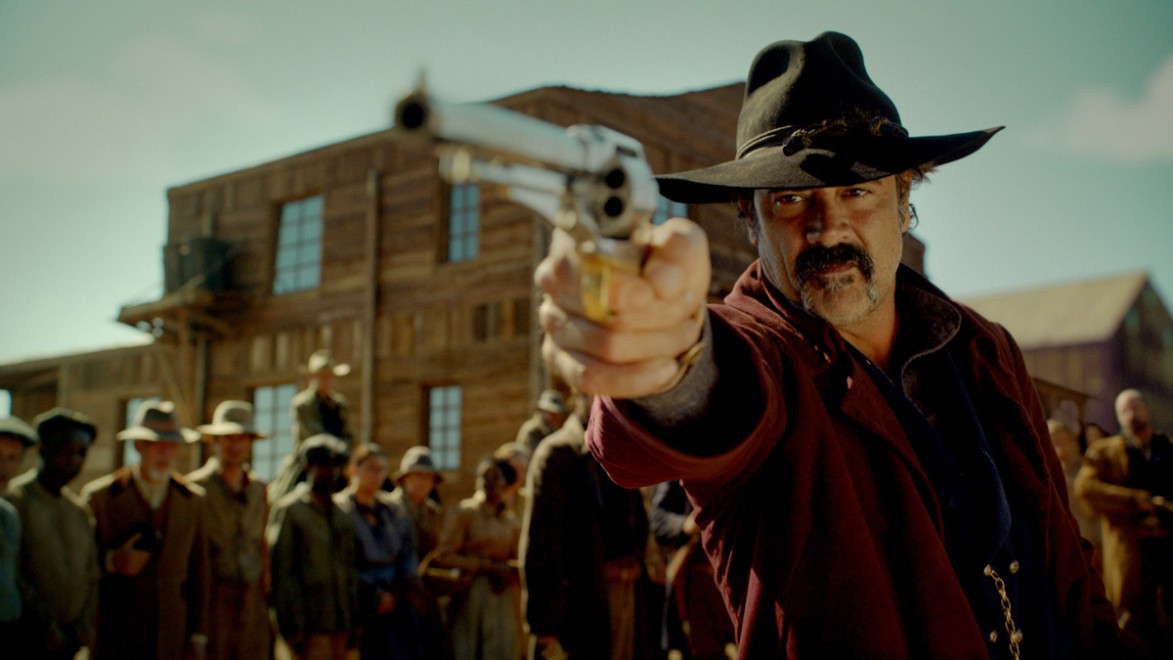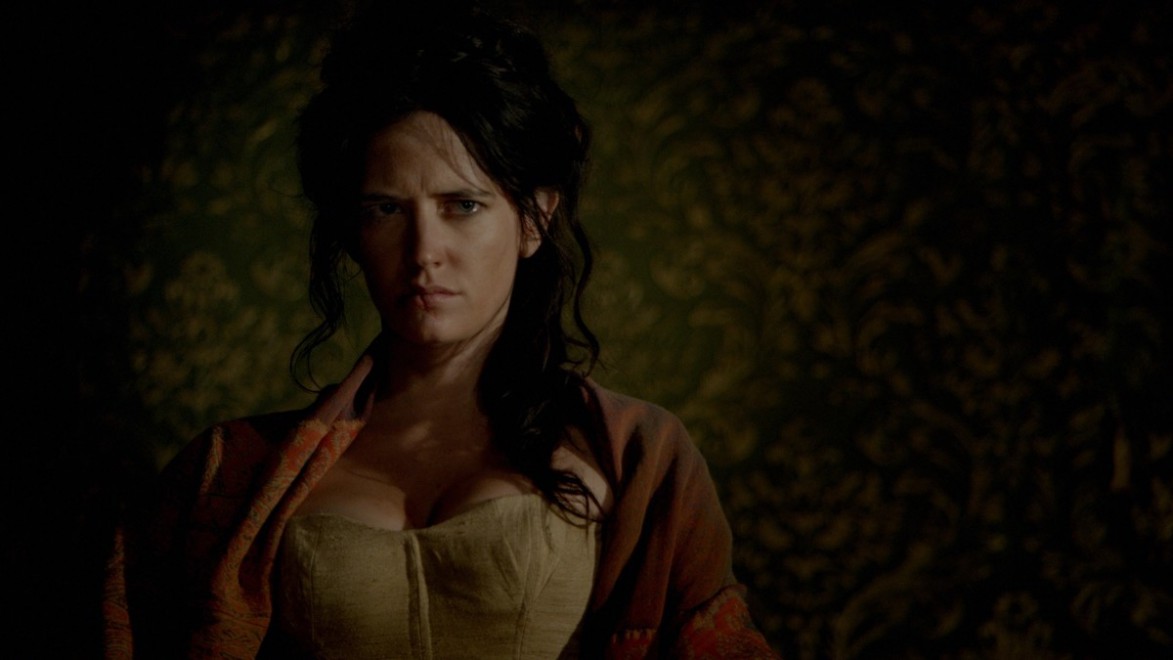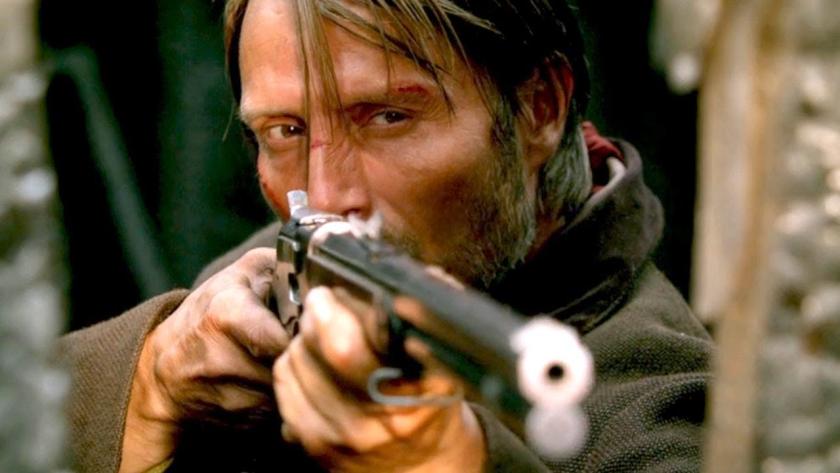Boasting one of the most appealingly eclectic casts in recent memory, The Salvation – from Dogme 95 director Kristian Levring – might have hoped to emulate the success of Sergio Leone's Italian-infused approach by bringing a Danish flavour to traditional western proceedings. But by relying too heavily on the tried and tested it fails to distinguish itself, meaning that the "smørrebrød" western seems unlikely to replace its spaghetti cousin in audience affections any time soon.
Set in America in 1871, it begins promisingly with a soon-to-be-shattered softness as a nervous Dane, Jon (Mads Mikkelsen), awaits the arrival of the family he's been separated from for seven years, as he establishes a new life for them in "the land of the free". The joy of the reunion is tenderly relayed as Jon takes in the sight of his luminous wife Marie (Nanna Øland Fabricius) and son Kresten (Toke Lars Bjarke) as if he can barely believe what he sees.
 When his wife and son are slain as they travel by stagecoach to their new home, Jon's bloody takedown of the perpetrators ends up incurring the wrath of local villain Delarue (Jeffrey Dean Morgan, pictured right looking the part in a maroon duster with a salt and pepper handlebar moustache), who loses his brother in the attack. Delarue is holding the residents of Black Creek to ransom, a fledgling community trying to scratch a living from barren land, led by their cowardly mayor/undertaker Keane (Jonathan Pryce) and their sheriff/priest Mallick (Douglas Henshall).
When his wife and son are slain as they travel by stagecoach to their new home, Jon's bloody takedown of the perpetrators ends up incurring the wrath of local villain Delarue (Jeffrey Dean Morgan, pictured right looking the part in a maroon duster with a salt and pepper handlebar moustache), who loses his brother in the attack. Delarue is holding the residents of Black Creek to ransom, a fledgling community trying to scratch a living from barren land, led by their cowardly mayor/undertaker Keane (Jonathan Pryce) and their sheriff/priest Mallick (Douglas Henshall).
Delarue's gang includes a snarling Eric Cantona and the pitiable Madelaine (Eva Green, pictured below left giving Once Upon a Time in the West's Claudia Cardinale a run for her money as a diamond in the rough). Scarred, mute and facially branded after an attack by Indians, she's the still-stubbornly-beautiful wife of the deceased man who finds herself passed like property to his similarly brutish brother. Bringing considerable dignity and defiance to the role, she acts as a striking reminder of a woman's miserable lot in the "Wild West".
By initially dwelling on Jon's attempt to fit in and modest hopes for a better life, The Salvation ensures the continued resonance of this kind of tale. Levring has described the film as his "tribute to the classic American western" but it's a little too wedded to the cinematic past; the sometimes dynamic camerawork and imagery recalls the work of Ford and Leone in particular, and there's a request for a debt to be settled by noon.
 However, vital elements like the score fail to make an impression and there's a notable lack of urgency and tension until the final showdown, which is at least crafty and suspenseful, and nearly enough to make you forget the film's flaws. The dialogue is chewy and on occasion effective, but it could have done with a little more snap and humour. Mikkelsen consistently convinces but he's a rather too subtle presence here, seemingly overwhelmed by the iconic environs and, with Morgan gleefully hamming it up as his adversary, there's an imbalance. And at just 92 minutes, it's unusually short for the genre, feeling underexplored and insufficiently fleshed out.
However, vital elements like the score fail to make an impression and there's a notable lack of urgency and tension until the final showdown, which is at least crafty and suspenseful, and nearly enough to make you forget the film's flaws. The dialogue is chewy and on occasion effective, but it could have done with a little more snap and humour. Mikkelsen consistently convinces but he's a rather too subtle presence here, seemingly overwhelmed by the iconic environs and, with Morgan gleefully hamming it up as his adversary, there's an imbalance. And at just 92 minutes, it's unusually short for the genre, feeling underexplored and insufficiently fleshed out.
Great westerns are emphatically still being made. The Assassination of Jesse James by the Coward Robert Ford is a work of great majesty; The Proposition is as searing as anything that came before it; while Tarantino fused his love of the genre and contempt for the slave trade in Django Unchained, which managed to be both incendiary and huge amounts of fun; The Homesman and Meek's Cutoff gave the western a stirring feminist spin; and last week's Jauja (a similarly Danish-American mash-up, this time South American) played with genre tropes to produce something surreal and unforgettable. Sadly, The Salvation lacks the ideas, swagger and idiosyncrasy to set it similarly apart. It intermittently impresses but simply isn't the sharp-shooter it at first seems.















Add comment